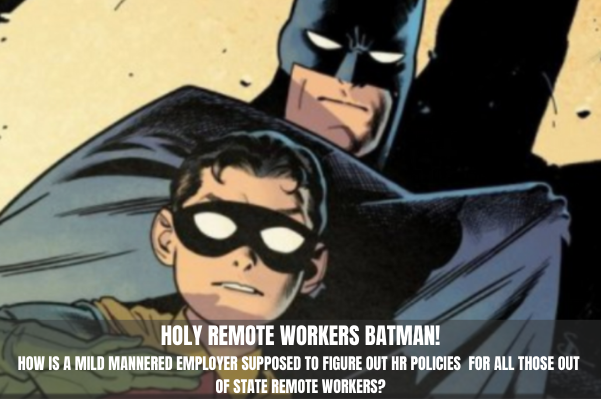
HOW IS A MILD MANNERED EMPLOYER SUPPOSED TO FIGURE OUT
HR POLICIES FOR ALL THOSE OUT OF STATE REMOTE WORKERS?
By Mark F. Kluger and William H. Healey
One of our avid readers writes in and asks:
Dear Mark and Bill:
When I told you in May 2020 that I was in charge of the office reopening, I freaked. But you guys really helped me out with all your good advice. Now I have another problem. While I was hiding under my desk here in Metropolis, wearing 2 N-95s, 3 surgical masks, and a face shield, my boss hired people from all over the world, like Pennsylvania, Delaware and someplace called St. Louis (is that in the Caribbean?), and they’re staying remote forever. So do I treat them like Metropolis employees? Do I give them the HR stuff that I give the people who work here in the Metropolis office or what? And do I have to get notices translated into their native languages. What do they even speak in St. Louis….St. Lousian? Please help me out again boys.
Bob from Accounting
Well Bob, you’re not alone. A May 2021 Gallup Poll showed that more than half of all US workers were still remote at that time, including 72% of white collar folks. According to another recent report, by 2025, more than 36 million Americans will be working remotely. Like your company, many employers learned that not all remote workers take mid-day naps and watch the Soaps like us, and that the talent pool can be vastly expanded when geography is not a factor. As a result, distance hiring is all the rage.
We all know that the feds and each state require employers to post notices in conspicuous locations designed to help employees sue their boss know their rights. When we first started as employment lawyers, those postings were limited to minimum wage, child labor, the end of prohibition—and not much more. Now, with employment laws sprouting up constantly, you can wallpaper an entire breakroom with the mandatory postings. The feds require notices on FLSA, EEO-Title VII, OSHA, the Polygraph Protection Act (for the all the endangered Polygraphs), FMLA, USERRA and FFCRA. Federal contractors get 7 more and E-verify users 2 more.
Many states have even more posting requirements than the feds. New Jersey alone requires 14 individual postings, 3 notices that must be given to new hires and several for annual distribution. California surprisingly only has 14. Maryland requires 13 for posting, 1 to be handed to new hires and 1 attached to the application. Pennsylvania has 11 mandatory postings. Even Wyoming has 4 notices that must be posted, including one about its $5.15 minimum wage. These state law and city ordinance notices typically include, Unemployment, Disability and Workers Comp insurance info, state minimum wage, paid sick leave, family leave, child labor and smoking (in the boys room which still ain’t allowed in school).
Bob, you want to know what postings are required for which workers and how they can see them from so far away. Before we get to the how, let’s start with the what.
If a New Jersey employer hires a California employee, what employment laws apply to the relationship? In addition to the federal laws, typically an employer is obligated to comply at least with the employment laws of the state in which the employee works, but some of the employer’s home state laws may also apply. So the New Jersey employer, watching the smoke billow above the Turnpike, must ensure that the employee sitting home watching the waves crash into the Malibu cliffs receives all the benefits of California employment law, including notices informing the dude of his rights under all those laws.
On December 23, 2020, the feds weighed in on this topic, as an early X-mas present to employers. Apparently, unable to decipher the directions for putting together their kiddies’ presents, USDOL staff took out their frustration on us with a set of mind-numbing instructions of their own. The guidance explains that any statute, like the FLSA and FMLA, which require “continuous posting” at the worksite, cannot be satisfied by mailing a copy to a remote worker because that is not continuously posted. We would have suggested a company policy that requires remote workers to hang all those notices on the fridge, next to little Bobby’s picture of a sail boat, but nobody asked us. Instead, the DOL said “electronic posting” on a company intranet, website or shared drive will do, provided employees regularly receive information that way, all remote employees have continuous access to those forms of media, and they do not need to be granted access to view the notices.
The guidance also said that some federal statutes require individual notices to be provided to all employees and those can be satisfied by email, again if employees regularly receive information that way. In this context, the otherwise employer-friendly and easy-to-use FMLA throws us yet another curve ball. The FMLA notice is supposed to be conspicuously posted for employees and applicants to see. So the DOL says if interviews are remote, the electronic location for the FMLA notice must be accessible to applicants. Seriously? One last thing: employers must provide notice to remote workers of where to find the notices. Yup, that’s right. A notice about the notices. Having fun yet?
The fun is actually just beginning though because there is no central, online resource to figure out which state and local notices even exist. This requires a crawl through each state’s websites. According to one source, there are over 175 state and federal agencies responsible for 390 postings and 22,000 locals that have the ability to issue their own. Only after finding the info can we figure out what notices can be e-posted or must be delivered directly. We’ve been doing this deadly dull task for our clients with remote workers in exotic, faraway places, like St. Louis, to ensure that they are in compliance. As you can imagine, it won’t take long for the feds and states to realize this could be a real money maker for them as most employers (that don’t subscribe to Mark and Bill’s musings) are ill-informed and won’t know about these requirements. Failure to post the feds OHSA notice alone can cost an employer more than $13,000. Yeah, right!
Bottom line, Bob, is that you need to let us know where all your new remote employees call home and we’ll get you the notices to post on your intranet, dedicated drive or on billboards across from their houses. Deep breath buddy, we got this.









